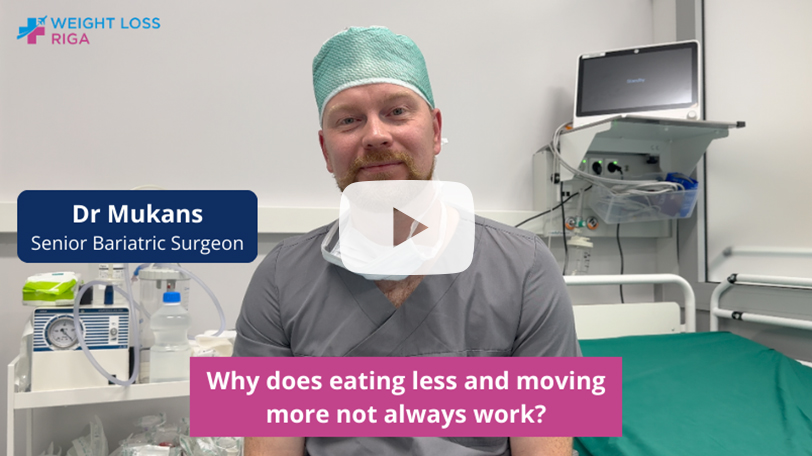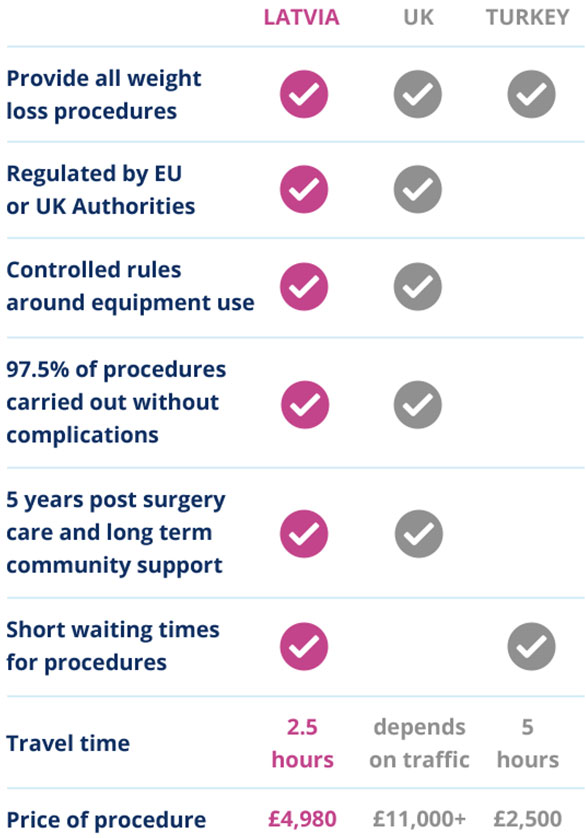SAY GOODBYE TO YO-YO DIETING AND HELLO TO LASTING WEIGHT LOSS SUCCESS
Join Helen & 2500+ success stories taking control of their weight with
weight loss surgery in Latvia by the expert bariatric surgeons at Weight Loss Riga

Rated 5 stars on Trustpilot
As Featured On

say goodbye to yo-yo dieting and hello to lasting weight loss success
Join Helen & 2500+ success stories taking control of their weight with weight loss surgery in Latvia by the expert bariatric surgeons at Weight Loss Riga
As Featured On

WHY PATIENTS OPT FOR WEIGHT LOSS SURGERY
The inability to maintain weight loss is scientifically proven to not be your fault. When you're overweight, your metabolic set point rises with your weight - setting a new fixed point each time. When dieting, you lose weight below your body's new set point but doesn't reset it. The moment you stop dieting your body pulls you back to your metabolic set point. Weight loss surgery resets your metabolic set point helping you achieve lasting weight loss success.
WHY PATIENTS OPT FOR WEIGHT LOSS SURGERY
The inability to maintain weight loss is scientifically proven to not be your fault. When you're overweight, your metabolic set point rises with your weight - setting a new fixed point each time. When dieting, you lose weight below your body's new set point but doesn't reset it. The moment you stop dieting your body pulls you back to your metabolic set point. Weight loss surgery resets your metabolic set point helping you achieve lasting weight loss success.
AND WHY THEY choose weight
loss riga
|
|
|
AND WHY THEY choose weight loss riga
- Top tier European clinic
- State of the art facilities
- EU regulated surgeons
- Lasting results within weeks
- Affordable pricing
- Over 2,500 successful procedures carried out
OUR WEIGHT LOSS
PROCEDURES abroad
-
Gastric Sleeve
BMI 30+As the least invasive bariatric procedure, gastric sleeve surgery helps patients losing half their excess weight within the 12 months.
-
Gastric Bypass Surgery
BMI 35+Gastric bypass surgery is a popular weight loss procedure that’s consistently proven to be an effective mechanism for shedding weight and maintaining your ideal weight.
-
Mini Gastric Bypass Surgery
BMI 35+Mini gastric bypass surgery is a simpler and surgically quicker way of achieving the same benefits of standard gastric bypass.

|
Connect with others considering weight loss surgery for lasting results |
OUR WEIGHT LOSS
PROCEDURES ABROAD
-
Gastric Sleeve
BMI 30+As the least invasive bariatric procedure, gastric sleeve surgery helps patients losing half their excess weight within the 12 months.
-
Gastric Bypass Surgery
BMI 35+Gastric bypass surgery is a popular weight loss procedure that’s consistently proven to be an effective mechanism for shedding weight and maintaining your ideal weight.
-
Mini Gastric Bypass Surgery
BMI 35+Mini gastric bypass surgery is a simpler and surgically quicker way of achieving the same benefits of standard gastric bypass.

Connect with others considering weight loss surgery for lasting results

Personal Nutritionist
Work closely with one of our specialist nutritionists to tackle dysfunctional eating habits and get personalised dietary advice. So you can develop the skills and know-how needed to both lose your excess weight and keep it off long term.

Psychotherapy support
Support from other bariatric patients, educational material, and personal sessions with both a therapist and a functional nutritionist are just a couple of the way working with our psychotherapy support team after your surgery will give you guidance, knowledge and confidence needed to overcome the psychological and nutritional challenges linked to obesity remission and bariatric surgery success

Community support
Following your surgery, our team will continue to check-in and support you for 5 years post surgery You'll also be added to a family-like group of bariatric patients supporting one another by answering questions, sharing tips and recommendations and showcasing their so you're supported along ththroughout your beriatric journey.

Personal Nutritionist
Work closely with one of our specialist nutritionists to tackle dysfunctional eating habits and get personalised dietary advice. So you can develop the skills and know-how needed to both lose your excess weight and keep it off long term.

Psychotherapy support
Support from other bariatric patients, educational material, and personal sessions with both a therapist and a functional nutritionist are just a couple of the way working with our psychotherapy support team after your surgery will give you guidance, knowledge and confidence needed to overcome the psychological and nutritional challenges linked to obesity remission and bariatric surgery success

Community support
Following your surgery, our team will continue to check-in and support you for 5 years post surgery You'll also be added to a family-like group of bariatric patients supporting one another by answering questions, sharing tips and recommendations and showcasing their so you're supported along ththroughout your beriatric journey.
TREATMENT THAT
DOESN‘T BREAK THE BANK

Recent reviews
Recent reviews



Meet the medical team at
weight loss riga
Meet the medical
team at weight
loss riga
Years Of Surgical
Experience
Years Specialising In
Bariatric Surgery
Procedures Performed
Every Year
Private Rooms With WIFI,
TV & Private Bathroom

Dainis Seimuskins
Head of Anesthesiology

Galina Cui
Gastroenterologist

Guna Bilande
Nutritionist

Mim Dickens
Head of Patient Coordination team

Dainis Seimuskins
Head of Anesthesiology

Guna Bilande
Nutritionist

Galina Cui
Gastroenterologist

Mim Dickens
Head of Patient
Coordination team

Discover how 2500+ UK patients achieved lasting weight loss success and learn everything you need to know about weight loss surgery
 |
Get the guide within seconds
|

Discover how 2500+ UK patients achieved lasting weight loss success and learn everything you need to know about weight loss surgery

within seconds
FREQUENTLY ASKED QUESTIONS
FREQUENTLY ASKED
QUESTIONS
BMI CALCULATOR
| Gastriс Sleeve | BMI 30+ |
| Mini Gastric Bypass | BMI 35+ |
| Gastric Bypass | BMI 35+ |














